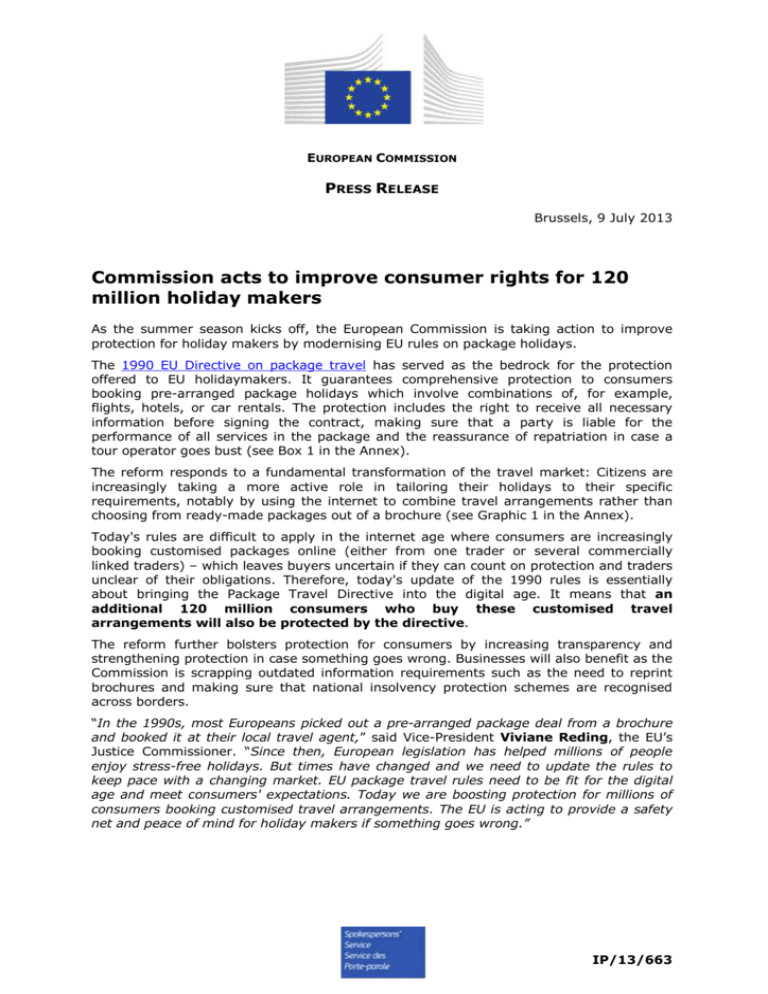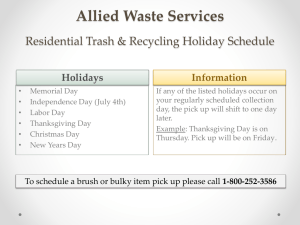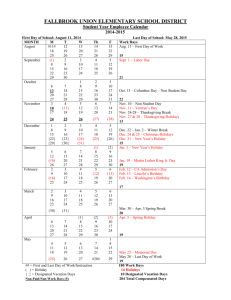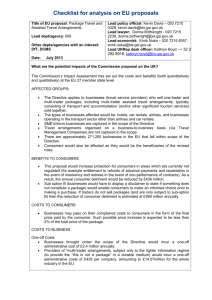DOC - Europa
advertisement

EUROPEAN COMMISSION PRESS RELEASE Brussels, 9 July 2013 Commission acts to improve consumer rights for 120 million holiday makers As the summer season kicks off, the European Commission is taking action to improve protection for holiday makers by modernising EU rules on package holidays. The 1990 EU Directive on package travel has served as the bedrock for the protection offered to EU holidaymakers. It guarantees comprehensive protection to consumers booking pre-arranged package holidays which involve combinations of, for example, flights, hotels, or car rentals. The protection includes the right to receive all necessary information before signing the contract, making sure that a party is liable for the performance of all services in the package and the reassurance of repatriation in case a tour operator goes bust (see Box 1 in the Annex). The reform responds to a fundamental transformation of the travel market: Citizens are increasingly taking a more active role in tailoring their holidays to their specific requirements, notably by using the internet to combine travel arrangements rather than choosing from ready-made packages out of a brochure (see Graphic 1 in the Annex). Today's rules are difficult to apply in the internet age where consumers are increasingly booking customised packages online (either from one trader or several commercially linked traders) – which leaves buyers uncertain if they can count on protection and traders unclear of their obligations. Therefore, today's update of the 1990 rules is essentially about bringing the Package Travel Directive into the digital age. It means that an additional 120 million consumers who buy these customised travel arrangements will also be protected by the directive. The reform further bolsters protection for consumers by increasing transparency and strengthening protection in case something goes wrong. Businesses will also benefit as the Commission is scrapping outdated information requirements such as the need to reprint brochures and making sure that national insolvency protection schemes are recognised across borders. “In the 1990s, most Europeans picked out a pre-arranged package deal from a brochure and booked it at their local travel agent,” said Vice-President Viviane Reding, the EU’s Justice Commissioner. “Since then, European legislation has helped millions of people enjoy stress-free holidays. But times have changed and we need to update the rules to keep pace with a changing market. EU package travel rules need to be fit for the digital age and meet consumers' expectations. Today we are boosting protection for millions of consumers booking customised travel arrangements. The EU is acting to provide a safety net and peace of mind for holiday makers if something goes wrong.” IP/13/663 "Tourism is an important source of growth for our economy, representing today some 1.8 million businesses and approximately 9.7 million jobs, while employing a significant proportion of our young people," said Vice-President Antonio Tajani, Commissioner, esponsible for Industry and Enterprises. "If tourists feel safe purchasing and using travel services in package format – for example when buying a flight and arranging car hire or accommodation all via the same provider - the industry will growth even further and faster. This is the main goal of today's proposal: to support all travel packages both onand off-line while ensuring a balanced set of rights for travellers." In addition to extending existing protection to customised packages, the reform brings new benefits for consumers and businesses. For buyers of traditional and customised packages, today’s proposal will bring: stricter controls on price surcharges (with a 10% cap on price increases) and a requirement to pass on price reductions in equivalent circumstances improved cancellation rights: Consumers will enjoy more flexibility by being able to terminate the contract before leaving home and paying the organiser a reasonable compensation. They will also be able to cancel the contract, free of charge, before departure in the event of natural disasters, civil unrest, or similar serious situations at the destination that would affect the holiday, when, e.g. the embassies give negative travel advices. better information on liability: in a plain and intelligible language consumers will need to be informed that the organiser is responsible for the proper performance of all included services – whereas today diverging national rules concerning the responsible party (organiser, retailer or both) lead to a situation where organisers and retailers refer the consumer to the other party, neither of them taking responsibility. better redress: in addition to price reductions in case a travel service has not been performed as it should have been, consumers can also claim compensation for any 'immaterial damage' suffered, in particular in case of a spoilt holiday a single contact point if something goes wrong: Consumers will be able to address complaints or claims directly to the retailer (travel agent) from whom they bought their holiday. For buyers of other customised travel arrangements, today's proposal entails: a right to get their money back and be repatriated, if needed, in case the seller, the carrier or any other relevant service provider goes bankrupt while they are on holiday, better information about who is liable for the performance of each service. 2 For businesses today's proposal will cut red tape and compliance costs by: creating a level playing field between different operators, abolishing outdated requirements to reprint brochures, thereby saving tour operators and travel agents an estimated €390 million per year, excluding managed business travel from the Directive, which is expected to lead to savings of up to € 76 million per year, providing EU-wide rules on information, liability and mutual recognition of national insolvency protection schemes, thus facilitating cross-border trade. Background The 1990 Package Travel Directive (90/314/EEC) has successfully been protecting consumers booking pre-arranged package holidays for over 20 years. It protects European consumers going on holiday and covers pre-arranged package holidays combining at least two of the following services: (1) transport, (2) accommodation (3) other tourist services, such as sightseeing tours, when the services cover more than 24 hours or include an overnight stay. The existing Directive provides protection covering: information requirements and liability of tour operators for the performance of travel services, which means that tour operators have to ensure that all services included in the package (e.g. flight and hotel accommodation) are provided and are up to the required standard, as well as protection (reimbursement of pre-payments or repatriation) in the case of a tour operator going bust. The rules need to be updated as more and more travellers put together their holidays on the internet meaning that holiday makers are not always sure of protection if something goes wrong. Around 23% of consumers book pre-arranged traditional package holidays - which are already covered by the 1990 EU Package Travel Directive. But another 23% buy customised holidays which are put together by one or more commercially linked traders to suit the needs and preferences of the customers. For example, consumers might book transport and a hotel from the same operator, or rent a car via the website where they booked their flight. Today's rules either simply do not cover such arrangements, or do so only in an ambiguous manner, leaving consumers unsure of their rights and traders unclear of their obligations (see Graphic 2 in the Annex). As a result, in a recent survey, 67% of EU citizens mistakenly thought that they were protected when buying such travel arrangements when they were not. The aim of the reform is therefore to make sure that all those buying customised holidays are suitably protected, either as packages or as a new form of protected arrangement. Today's reform is the result of extensive consultations. The Commission launched a public consultation on the revision of the Directive in November 2009 (IP/09/1824). The consultation focused on possible ways of solving the main limitations of the existing package travel rules. On 22 April 2010 the Commission held a stakeholder workshop and on 5 June 2012 a conference with stakeholders and Member States on the revision of the Package Travel Directive. In January 2013, the Commission met with consumer groups and business leaders of the travel industry to discuss the review of the current EU legislation on package holidays (MEMO/13/42). 3 For more information European Commission – package travel directive: http://ec.europa.eu/justice/consumer-marketing/travel/package/index_en.htm Homepage of Vice-President Viviane Reding, EU Justice Commissioner: http://ec.europa.eu/reding Justice Directorate General Newsroom: http://ec.europa.eu/justice/newsroom/index_en.htm Contacts : Mina Andreeva (+32 2 299 13 82) Natasha Bertaud (+32 2 296 74 56) 4 Annex Box 1: THE 10 KEY RIGHTS UNDER THE 1990 PACKAGE TRAVEL DIRECTIVE 1. You receive all necessary information about the holiday before you sign the contract. 2. You always have one party (either the retailer or the organiser: the name and address will always be specified in the contract) that is liable for the correct performance of all the services included in the contract. 3. You are given an emergency number or a contact point where you can get in touch with the organiser or the travel agent. 4. You can transfer your booking to another person, if you cannot leave on holiday yourself. 5. The price of your trip cannot be changed later than 20 days before departure, and before that only in very limited situations. 6. You can cancel the contract and get your money back if any of the essential elements of the travel package has been changed. 7. If, before departure, the trader that is responsible for your holiday cancels the package, you can get a refund and compensation, if appropriate. 8. If, after departure, important parts of the package cannot be provided, alternative arrangements have to be made, at no extra cost, for you to continue your holiday. 9. You have the right to be given prompt assistance if you are in difficulty. 10. If the trader responsible goes bankrupt, your pre-payments will be refunded and, if your trip has begun, you will be repatriated. 5 Graphic 1: Distinction between combined travel arrangements and pre-arranged packages Pre-arranged packages: Pre-packaged operators arrangements by tour Little flexibility for consumers as to the dates and prices; multiple choices but limited ability to customise Combined travel arrangements: Packaging is done with the customer in real-time on the basis of available components, enhanced possibility for the consumer to customise, real-time availability and real-time booking. Graphic 2: Scope of the 1990 EU Package Travel Directive (PDT) The figure illustrates the scope of the Directive in relation to different travel arrangements. 6







